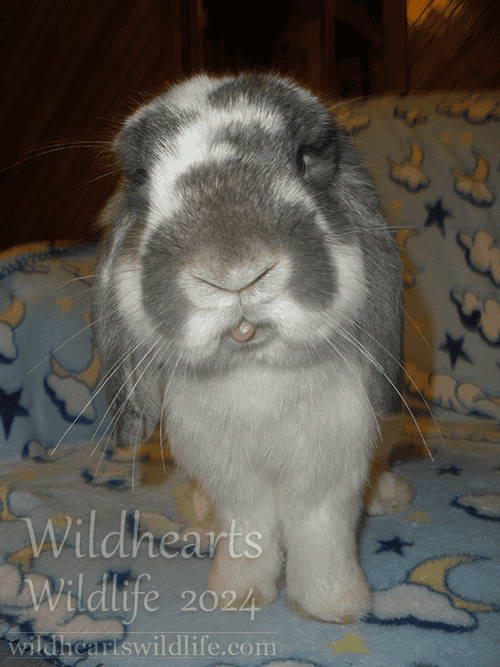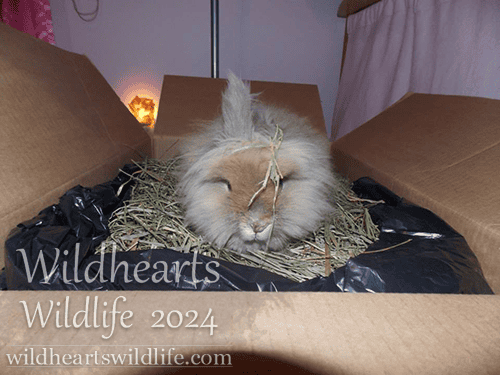The adorable rabbits pictured in this post are some of the fluffers I had the pleasure of sharing my life with in the past. I don’t keep rabbits currently, but used to keep house rabbits. My last one, Barnaby, was a rescue who lived an amazing 11 years as part of the Wild Hearts family. For many years I was heavily involved in rabbit rescue, so almost all of my house bunnies were rescues.
Rabbits & Allergies

Not everyone seems to be aware of the fact that, unfortunately, domestic rabbits are rehomed, and abandoned, in high numbers throughout the US. There are many reasons why a pet owner may choose to give up a pet – but the one I want to focus on in this post is allergies.
Pet rabbits can pack a one-two punch to people who suffer from allergies. It is possible to be allergic to rabbits themselves. What I’ve found to be even more common is hay allergies. I have first hand experience in this. I found out after adopting my first rabbit, that I am actually highly allergic to Timothy hay (the most common type of grass hay fed to pet rabbits). Unfortunately, you can’t keep rabbits as pets without dealing with hay. Grass hays should make up between 80% – 90% of your rabbits diet.
My hay related allergies cause my eyes to become very itchy and watery, and my nose to run. On a couple of occasions, accidentally breathing in hay dust caused me to have difficulty breathing. Handling Timothy hay causes itchy red bumps to appear on my hands. Hopefully you’re getting the picture that it was making me pretty miserable. Thankfully, for my bunnies sake, I found a solution – one that allowed me to keep the rabbits that I loved without having to risk my health by doing so!
Try Different Hays!
You’ve probably already guessed what it was by the title of this post. I switched hays! Turns out, that while Timothy hay is the stuff of my allergy nightmares, orchard grass doesn’t bother me. I mentioned that Timothy hay is the most common type of hay fed to pets. Well it turns out that people who are allergic to hay most commonly have the worst symptoms when dealing with Timothy hay.

Other types of grass hays include oat hay, Bermuda grass, meadow hay, and orchard grass. There are other types as well, but those ones are the most common. Rabbits require unlimited access to fresh grass hay, but it does not have to be any specific type of grass hay.
I know that switching hay may seem like common sense to seasoned pet owners, but it’s the first thing I always recommend to rabbit owners who used to contact me about giving up their rabbit(s) due to allergies. I’ve had instances were people have insisted that they were allergic to their rabbits, not hay, but then experienced dramatic decreases in allergy symptoms after switching hays. Rabbits spend so much time eating, and playing in their hay that they can get hay dust in their fur, causing people who may just have a hay allergy to believe that they are allergic to their pets themselves.
Worth A Try

I’m not saying this is a cure all for rabbit allergy issues. I’m sure there are some people out there who are bothered by all types of grass hays, and some who are actually allergic to rabbit dander. Even to those who are just bothered by some types of hay, finding which kinds don’t bother you can take trial and error, and I understand that this can be a very uncomfortable process. But, for me at least, it was more than worth it. I wouldn’t have gotten rid of my rabbits due to my hay allergies, despite how miserable they were making me. Switching hays allowed me to keep my furry friends without having to deal with the constant discomfort of my allergy symptoms.
If it can mean the difference between even just a handful of rabbits getting to stay in loving homes, verses being sent to a shelter because of allergies, than I think this is a message worth putting out there. If you are thinking of giving up your hay eating animal due to allergies, please consider trying some other types of hay first! I’m living proof that it’s possible to be highly allergic to one type of hay, but fine with others. I know the trial and error process can be rough, but if it’s successful than your pet will reward your efforts with a lifetime full of unconditional love.
———————
Unfortunately, Wild Hearts Wild Life has been dealing with content scrappers stealing our content and posting it to other websites without permission. If you’re seeing this article posted anywhere besides wildheartswildlife.com it means you are seeing it on a content scalper’s site. Please consider contacting us to let us know, and stopping by to visit on our actual site! Thank you!
